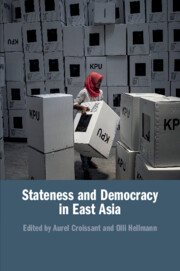Book contents
- Stateness and Democracy in East Asia
- Stateness and Democracy in East Asia
- Copyright page
- Contents
- Figures
- Tables
- Contributors
- Acknowledgements
- 1 Introduction: Rethinking Stateness and Democracy in East Asia
- 2 State-Building and Democratization
- 3 South Korea’s Democracy and the Legacies of the Developmental State
- 4 After Hegemony: State Capacity, the Quality of Democracy and the Legacies of the Party-State in Democratic Taiwan
- 5 Democratization Interrupted: The Parallel State and the Demise of Democracy in Thailand
- 6 Weak State and the Limits of Democratization in Cambodia, 1993–2017
- 7 The Institutional Roots of Defective Democracy in the Philippines
- 8 Stateness and State Capacity in Post-Authoritarian Indonesia: Securing Democracy’s Survival, Entrenching Its Low Quality
- 9 As Good as It Gets? Stateness and Democracy in East Timor
- 10 Stateness and Democracy: Evidence from East Asia and Cross-Regional Comparisons
- Index
- References
6 - Weak State and the Limits of Democratization in Cambodia, 1993–2017
Published online by Cambridge University Press: 13 May 2020
- Stateness and Democracy in East Asia
- Stateness and Democracy in East Asia
- Copyright page
- Contents
- Figures
- Tables
- Contributors
- Acknowledgements
- 1 Introduction: Rethinking Stateness and Democracy in East Asia
- 2 State-Building and Democratization
- 3 South Korea’s Democracy and the Legacies of the Developmental State
- 4 After Hegemony: State Capacity, the Quality of Democracy and the Legacies of the Party-State in Democratic Taiwan
- 5 Democratization Interrupted: The Parallel State and the Demise of Democracy in Thailand
- 6 Weak State and the Limits of Democratization in Cambodia, 1993–2017
- 7 The Institutional Roots of Defective Democracy in the Philippines
- 8 Stateness and State Capacity in Post-Authoritarian Indonesia: Securing Democracy’s Survival, Entrenching Its Low Quality
- 9 As Good as It Gets? Stateness and Democracy in East Timor
- 10 Stateness and Democracy: Evidence from East Asia and Cross-Regional Comparisons
- Index
- References
Summary
This chapter argues that the democratic transition in Cambodia was a product of external imposition through the 1991 Paris Peace Agreement. The accords authorized the United Nations Transitional Authority in Cambodia in 1992–93 to oversee the democratic transition by organizing multi-party elections and to assist in the drafting of a new liberal democratic constitution. Across the next two decades, Cambodia’s democracy went through a period of electoral authoritarianism and in 2017 plunged into a de facto one-party authoritarianism. These developments derived from Cambodia’s weak state capacity. Cambodia’s entrenched neo-patrimonialism kept the quality of governance low in terms of administrative and extractive capacity but kept coercive capacity against democratic forces strong. As popular demand for deeper democracy and government accountability and responsiveness intensified, the Cambodian People’s Party (CPP) strengthened the state’s capacity by increasing revenue collection, public service provision and the quality of the bureaucracy. However, this reform is unlikely to lead to democratic deepening due to the CPP’s determination to preserve its interests and its ideational inclination to transform Cambodia into a developmental authoritarian state where economic growth takes precedence over liberal democracy.
Keywords
- Type
- Chapter
- Information
- Stateness and Democracy in East Asia , pp. 133 - 152Publisher: Cambridge University PressPrint publication year: 2020
References
- 2
- Cited by

